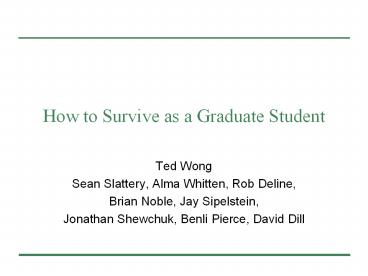How to Survive as a Graduate Student - PowerPoint PPT Presentation
Title:
How to Survive as a Graduate Student
Description:
Ted Wong. Sean Slattery, Alma Whitten, Rob Deline, Brian Noble, Jay Sipelstein, ... Ted Wong 30 August 2001. http://www.cs.cmu.edu/~tmwong/grad-how-to/ 7 ... – PowerPoint PPT presentation
Number of Views:56
Avg rating:3.0/5.0
Title: How to Survive as a Graduate Student
1
How to Survive as a Graduate Student
- Ted Wong
- Sean Slattery, Alma Whitten, Rob Deline,
- Brian Noble, Jay Sipelstein,
- Jonathan Shewchuk, Benli Pierce, David Dill
2
Why are we here?
- Learn how to survive and thrive
- Hear from the "experts"
3
Outline
- Getting started
- The early years
- The middle years
- Black Friday
- Fortune cookies
4
Format
- Question my authority!
- Focus on new students
- No names
5
Getting started
- Getting here
- Attending the Immigration Course
- Picking your new advisor
6
Getting here
- You have the ability to graduate
- You are responsible for graduating
7
Attending the Immigration Course
- Go to lots of talks!
- Find out what you're interested in
- Find out who is leading what research
- Find out who is looking for students
- Go to the social events
- Get to know the other students
- Get to meet faculty
8
Picking your new advisor
- Why is this so important?
- How do you choose?
- What do you look for in an advisor?
9
Why is an advisor so important?
- Your advisor is your mentor
- Your advisor is your manager
- Your advisor is your advocate
10
How do you choose an advisor?
- Talk to potential advisors
- Talk to current and former students
- Read their publications
11
What do you look for in an advisor?
- Approachability
- Compatibility
- Durability
- History
- Research
12
Choosing multiple advisors
- Pros
- Span research areas, skills, or styles
- Combine strengths of each advisor
- Cons
- Must manage several relationships
- Must balance demands
13
Changing advisors
- When to do it
- If your research interests diverge
- If your "styles" truly don't match
- What to look out for
- Changing frequently
- Changing right before Black Friday
14
The early years
- Building up your advisor relationship
- Taking classes
- Fulfilling requirements
- Avoiding common distractions
- FUD
15
Building up your advisor relationship
- Meet regularly with them
- Communicate openly with them
- Manage them
- Accommodate their needs
16
Taking classes
- The old way (previous century)
- Pass your classes (B-)
- Concentrate on research
- The apocryphal new way (this century)
- Excel at your classes (A)
- Concentrate on research (?!)
- The place-out?
17
Fulfilling requirements
- Teaching
- Teach a basic and an advanced class
- Keep close watch on the clock (1/2-time)
- Writing and speaking
- Practice these skills early and often
- Get lots of feedback before trying to pass
- Programming
- Talk to your advisor about expectations
18
Avoiding common distractions
- Zephyr is not research!
- Slashdot is not research!
- Community service is not a "distraction"!
19
FUD Fear, uncertainty, and doubt
- "I don't belong here" Imposter Syndrome
- "I'm the only person having a hard time"
- "I'm struggling in / failing a class"
20
Beating FUD
- Talk to other students
- Talk to your advisor
- Talk to Shawn Butler, the ombudsperson.
- Talk to Jeannette or Sharon
- Talk to Counseling Services
21
The middle years
- Becoming self-directed
- Beating pre-proposal FUD
22
Becoming self-directed
- Before
- External deadlines
- Self-contained problems
- Now
- Internal deadlines
- Open-ended problems
23
Beating pre-proposal FUD
- "I'm not cut out for research."
- It takes time to transition to self-direction
- It takes time to find thesis topic
- It is hard to do "research"
- "I want to leave."
- It is OK to leave
- Leaving is NOT failure!
- Staying out of stubbornness can lead to failure
24
Black Friday
- Don't panic!
- Ensure that you have an advocate
- Talk to your advocate before BF
25
Black Friday The process
- You fill out a form for your advisor (only!)
- Your advisor drafts a letter
- The faculty discusses and edits your letter
- You go to the Black Friday TG
- Jeannette signs the letter
26
Black Friday The letter
- "We are pleased. Next semester"
- Making satisfactory progress
- Try to reach suggested goals
- Alternatively, reach equivalent goals
- "To remain in good standing, you must"
- Reach required goals
- No, really reach required goals
- "So long, and thanks for all the fish."
27
Fortune cookies
Never surprise or be surprised by your advisor.
28
Fortune cookies
Once an advisor, always an advisor.
29
Fortune cookies
Talk with other students and faculty to get an
outside perspective on your research.
30
Fortune cookies
There is more than one partner in a
marriage. Being concerned with only one of them
is a BIG problem.
31
Fortune cookies
You probably cannot write or speak as well as you
can hack. Practice early and often.
32
Fortune cookies
Hacking is not research.
33
Fortune cookies
If you want to work, work. If you want to play,
play.
34
Fortune cookies
Work at least an hour a day. Make that hour the
first hour.
35
Fortune cookies
Keep outside interests and activities.
36
Fortune cookies
Your thesis has less to do with your career than
you think. What you can say about your thesis
has more to do with your career than you think.
37
Fortune cookies
Be honest to yourself about your abilities and
limits.
38
Fortune cookies
Be your own advocate.
39
Final fortune cookie
Have fun!

